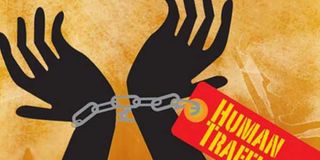State not doing enough to curb human trafficking, says US report

A poster used in campaigns against human trafficking. The State Department points to widespread trafficking of children within Kenya. PHOTO | FILE | NATION MEDIA GROUP
What you need to know:
Kenyan women are subjected to forced prostitution in Thailand by Ugandan and Nigerian traffickers, the State Department said.
- Young Kenyan men and women are lured to Somalia to join criminal and terrorist networks, sometimes with fraudulent promises of lucrative employment elsewhere.
- Nepalese, Indian, and Pakistani women recruited to work in mujra dance clubs in Nairobi and Mombasa face debt bondage, which they are forced to pay off by dancing and forced prostitution.
NEW YORK
Kenya has received a mixed assessment in a new US report on countries’ efforts to prevent human trafficking, assist its victims and punish its perpetrators.
“The government of Kenya does not fully meet the minimum standards for the elimination of trafficking but is making significant efforts to do so,” the US State Department said in a global survey released on Thursday.
Kenya thus remains among several countries listed in the second-best of four categories by which the US rates the extent of trafficking and governments’ responses to it. Inclusion in the lowest category means that a country may lose US aid and be subject to sanctions.
Improvements made by Kenya in the past year are said to include additional prosecutions and convictions of traffickers, investigations of officials’ involvement in trafficking crimes and allocation of new funding to help victims.
Kenya is continuing, however, to treat some victims as criminals, while providing a “negligible” degree of protective services to adults who have been trafficked, the State Department added.
“Corruption remained endemic across the government,” the report’s Kenya section found.
“Traffickers sometimes fraudulently obtained identity documents from complicit officials, and police often took bribes to warn traffickers of impending operations and investigations, particularly along the Coast.”
The Kenyan government said it was investigating an unspecified number of law-enforcement personnel who allegedly facilitated trafficking, but it did not report any successful prosecutions or convictions, the report noted.
The State Department points to widespread trafficking of children within Kenya. They are said to be coerced into domestic service, agricultural work, fishing, cattle herding, street vending and begging.
“Girls and boys are also exploited in commercial sex throughout Kenya, including in sex tourism on the Coast, in Nairobi and Kisumu, particularly in informal settlements,” the report states. “At times, their exploitation is facilitated by family members.”
CRIMINAL NETWORKS
Children are trafficked for purposes of sexual abuse by fishermen on Lake Victoria and by people working in miraa-growing areas, as well as near gold mines in western Kenya, the State Department observed.
Some Kenyans who migrate in search of employment are exploited in domestic servitude, massage parlours and brothels in Europe, the US, Southeast Asia and the Middle East, according to the report. It lists Saudi Arabia, Lebanon, Kuwait, Qatar, the United Arab Emirates and Oman as Middle East destinations where Kenyans have experienced forced manual labour or other forms of exploitation.
“Kenyan women are subjected to forced prostitution in Thailand by Ugandan and Nigerian traffickers,” the State Department said.
“Young Kenyan men and women are lured to Somalia to join criminal and terrorist networks, sometimes with fraudulent promises of lucrative employment elsewhere,” the report added.
“Nepalese, Indian, and Pakistani women recruited to work in mujra dance clubs in Nairobi and Mombasa face debt bondage, which they are forced to pay off by dancing and through exploitation in forced prostitution,” the US further reported.
Kenyan government statistics on the extent and nature of trafficking are incomplete, the State Department said.
It notes that in conjunction with NGOs, Kenyan authorities last year identified and referred to care at least 400 trafficking victims, both adults and children.
The government continued to improve its assistance for trafficked children and for Kenyan victims in other countries, the report found. It noted that the government allocated Sh60 million for anti-trafficking efforts in its yearly budget.





